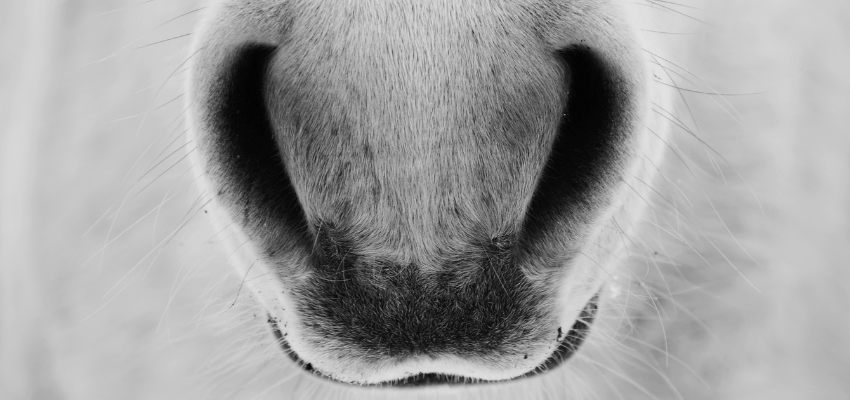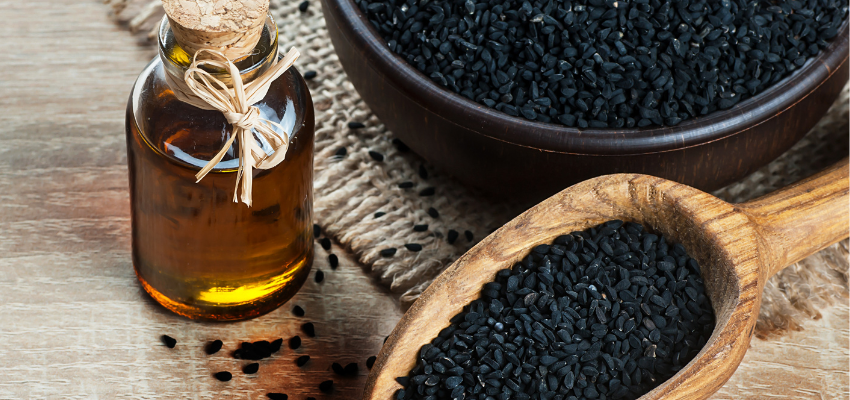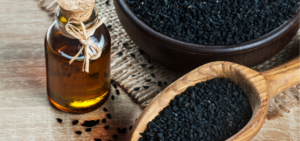Black seed oil is known for its diverse health benefits. But what makes this oil so special? In this article, you’ll discover everything you need to know about this oil for horses, from its effects, proper application, and dosage to potential side effects. Enjoy reading!
What is Black Seed Oil?
Black seed (Nigella sativa) is a traditional medicinal herb native to the West Asian region. Black seed oil is a nutty, peppery-tasting vegetable oil obtained by cold pressing the black seeds of the black seed plant. It is rich in unsaturated fatty acids, essential oils, minerals, trace elements, and vitamins, making it a valuable component in horse feeding.

What’s in Black Seed Oil?
The main components are:
- Unsaturated Fatty Acids: Black seed oil is rich in polyunsaturated fatty acids. 50-60% of the oil consists of linoleic acid, an essential Omega-6 fatty acid. This cannot be produced by your horse’s organism on its own. Additionally, the oil contains 20-25% oleic acid as an Omega-9 fatty acid.
- Essential Oils: Nigella Sativa contains several essential oils. These include valuable active ingredients such as thymoquinone, known for its antioxidant, anti-inflammatory, and antimicrobial effects. Another valuable substance is nigellone, which has a vasodilatory and mucus-dissolving effect.
- Minerals & Trace Elements: The oil contains a high amount of minerals and trace elements like zinc, magnesium, selenium, and magnesium.
- Vitamins: Black seed oil is rich in a variety of vitamins like Vitamin E, Vitamin B3, Vitamin B6, and folic acid.
How Does Black Seed Oil Affect Horses?
Black seed oil has numerous health benefits for your horse:

- Respiratory Support: The active substances thymoquinone and nigellone in black seed oil can positively influence your horse’s respiratory tract and help with respiratory diseases.
- Allergy Relief: Feeding black seed oil can alleviate allergies. Also, it has a histamine-lowering effect. Histamine is the hormone that mediates allergic reactions like itching and swelling.
- Immune System Boost: The high content of thymoquinone and other nutrients with antioxidant and anti-inflammatory properties, such as Vitamin E, can support your horse’s immune system and strengthen its defenses.
- Skin & Coat Improvement: The unsaturated fatty acids in the oil contribute to improving skin and coat health. They promote the formation of a healthy skin barrier, can reduce dry, flaky skin and itching, and ensure a shiny coat.
- Digestive Support: Black seed oil can support your horse’s digestion. It can prevent digestive issues like colic, diarrhea, and fecal water.

How Should I Feed My Horse Black Seed Oil?
You can either add the oil directly to your horse’s food or administer it with treats.
Consider the feeding recommendation of the respective manufacturer when feeding oil. The dosage varies based on your horse’s weight. Typically, for a large horse, manufacturers recommend a daily amount of 20-30 ml.
Conversely, experts suggest administering 10-15 ml of oil daily for ponies and small horses. Initially, it’s prudent to begin with a lower dosage, thereby slowly acclimating your horse’s gastrointestinal tract to the new feed and preventing digestive issues. Subsequently, you can incrementally increase the dose.
Possible Side Effects
Nigella seed oil is generally well tolerated. Nonetheless, some horses may experience side effects:
- Digestive Disturbances: If you feed your horse an excessively high dose of nigella seed oil, it could lead to digestive issues, such as diarrhea or fecal water. Therefore, it’s crucial to start with a low amount of this oil in your horse’s diet and gradually increase it.
- Weight Gain: Since nigella seed oil, like all oils, is calorie-dense, it may cause weight gain over time. Be mindful of the dosage and adjust it if needed.
- Interactions: Before incorporating nigella seed oil into your horse’s regimen, especially if they are already on other medications, consult your veterinarian. This precaution helps to prevent possible adverse interactions
What Should I Look for When Buying Black Seed Oil for Horses?
There are several things you should consider when buying:
- Purity from Contaminants: When you purchase, select an oil that has undergone testing for contaminants and bears certificates or seals verifying the product’s purity and absence of contaminants.
- Cold-Pressed: Advisably, use cold-pressed oil, extracted at low temperatures without chemical involvement. This method preserves the delicate fatty acids and other nutrients, preventing oxidation.
- Shelf Life: Ensure the high-quality oil comes in an airtight and opaque container. Such packaging maintains the oil’s freshness and effectiveness.”
Alternatives
There are various alternative oils that offer similar health benefits. The alternatives include:
- Flaxseed Oil: Flaxseed oil is pressed from the seeds of the flax plant. It is particularly rich in unsaturated fatty acids such as Omega-3 and Omega-6. In addition to these fatty acids, flaxseed oil also contains Vitamin E and other important nutrients and is free of protein. It can improve the skin and coat of your horse, contribute to joint health, strengthen the immune system, support metabolism and digestion, and serve as an energy source.
- Fish Oil: Fish oil is an excellent source of Omega-3 fatty acids, especially eicosapentaenoic acid (EPA) and docosahexaenoic acid (DHA). These can have positive effects on the skin and coat, joints, immune system, and cardiovascular system of your horse.
- Milk Thistle Oil: Milk thistle oil is extracted from the seeds of the milk thistle. It contains, among other things, polyunsaturated fatty acids such as Omega-6 and Omega-9, and the active ingredient silymarin. It supports the liver, contributes to the health of skin and coat, supports metabolism and digestion, and can have positive effects on heart health.
- Rice Bran Oil: Rice bran oil is a yellow to brownish vegetable oil extracted from rice bran. It is rich in unsaturated fatty acids such as Omega-3 and Omega-6 fatty acids and contains gamma-oryzanol. This is a plant fat that is found only in rice bran oil. The oil can support the muscle development and muscle performance of your horse, improve the health of the skin and coat, and serve as an energy source
Our Conclusion
Black seed oil, renowned for its varied health advantages, contains a rich blend of unsaturated fatty acids, essential oils, minerals, trace elements, and vitamins, all of which can beneficially impact your horse’s health.







